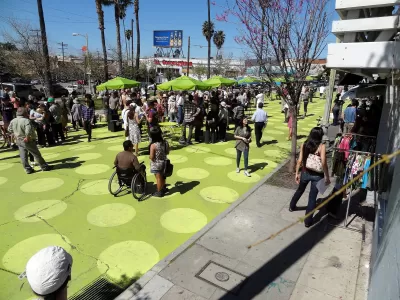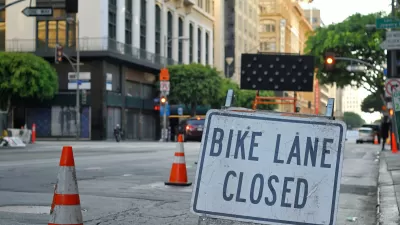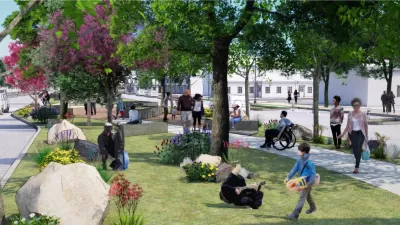The so-called car capital of the world is now a "hotbed for mobility disruption," a Harvard studio suggests.

A recent course at the Harvard Graduate School of Design explored the future of urban mobility in light of the rapid advent of automated, shared, and electric transportation technologies. The Future of Streets studio particularly focused on Los Angeles, where leaders said was innovation was bubbling in the private sector and "unprecedented investments" were being made in the public sector.
In a final studio discussion published in The Planning Report, Los Angeles city planner Claire Bowin touted the city's Mobility Plan 2035, which she said anticipated new mobility technologies by "set[ting] a policy foundation for enabling change." The plan shifted the city's car-centric transportation planning framework toward accommodating multiple users of the street space, in part by measuring traffic impacts in Vehicle Miles Traveled rather than Level of Service, she said.
Major auto companies like Nissan and Ford, eager to get ahead of the curve in new mobility markets, also participated.
Rachel Nguyen, executive director of the Renault Nissan Future Lab, said the car company's future role could be to "design and build vehicles for a future mobility system.” Nissan could also partner with cities to offer “decades of R&D on technologies to deliver zero emissions and zero fatalities,” she said. The lab recently joined the LA Cleantech Incubator's Transportation Electrification Partnership to promote EVs.
A question central to the future of urban mobility, the panelists said, was how to encourage carpooling and public transportation even as ride-hailing and autonomous vehicles become increasingly cost-competitive. "The only thing we know for certain about the future is that people will have more options," Nguyen said. "I believe that Metro stations will be the hubs of those multimodal options."
The discussion also touched on the intersection of transportation with land use. Ryan J. Westrom of Greenfield Labs, a subsidiary of Ford's Smart Mobility program, highlighted an organization started by Ford called the National Street Service "to create an advocate for the street—the largest portion of public space in the country." He also suggested that a bus system that is "appealing across the socio-demographic spectrum" is the recipe for achieving mass transit while preserving "a space that we all consider beautiful."
FULL STORY: The Future of Streets and the Value of Shared, Multimodal Transit

Alabama: Trump Terminates Settlements for Black Communities Harmed By Raw Sewage
Trump deemed the landmark civil rights agreement “illegal DEI and environmental justice policy.”

Planetizen Federal Action Tracker
A weekly monitor of how Trump’s orders and actions are impacting planners and planning in America.

The 120 Year Old Tiny Home Villages That Sheltered San Francisco’s Earthquake Refugees
More than a century ago, San Francisco mobilized to house thousands of residents displaced by the 1906 earthquake. Could their strategy offer a model for the present?

Ken Jennings Launches Transit Web Series
The Jeopardy champ wants you to ride public transit.

BLM To Rescind Public Lands Rule
The change will downgrade conservation, once again putting federal land at risk for mining and other extractive uses.

Indy Neighborhood Group Builds Temporary Multi-Use Path
Community members, aided in part by funding from the city, repurposed a vehicle lane to create a protected bike and pedestrian path for the summer season.
Urban Design for Planners 1: Software Tools
This six-course series explores essential urban design concepts using open source software and equips planners with the tools they need to participate fully in the urban design process.
Planning for Universal Design
Learn the tools for implementing Universal Design in planning regulations.
Clanton & Associates, Inc.
Jessamine County Fiscal Court
Institute for Housing and Urban Development Studies (IHS)
City of Grandview
Harvard GSD Executive Education
Toledo-Lucas County Plan Commissions
Salt Lake City
NYU Wagner Graduate School of Public Service





























